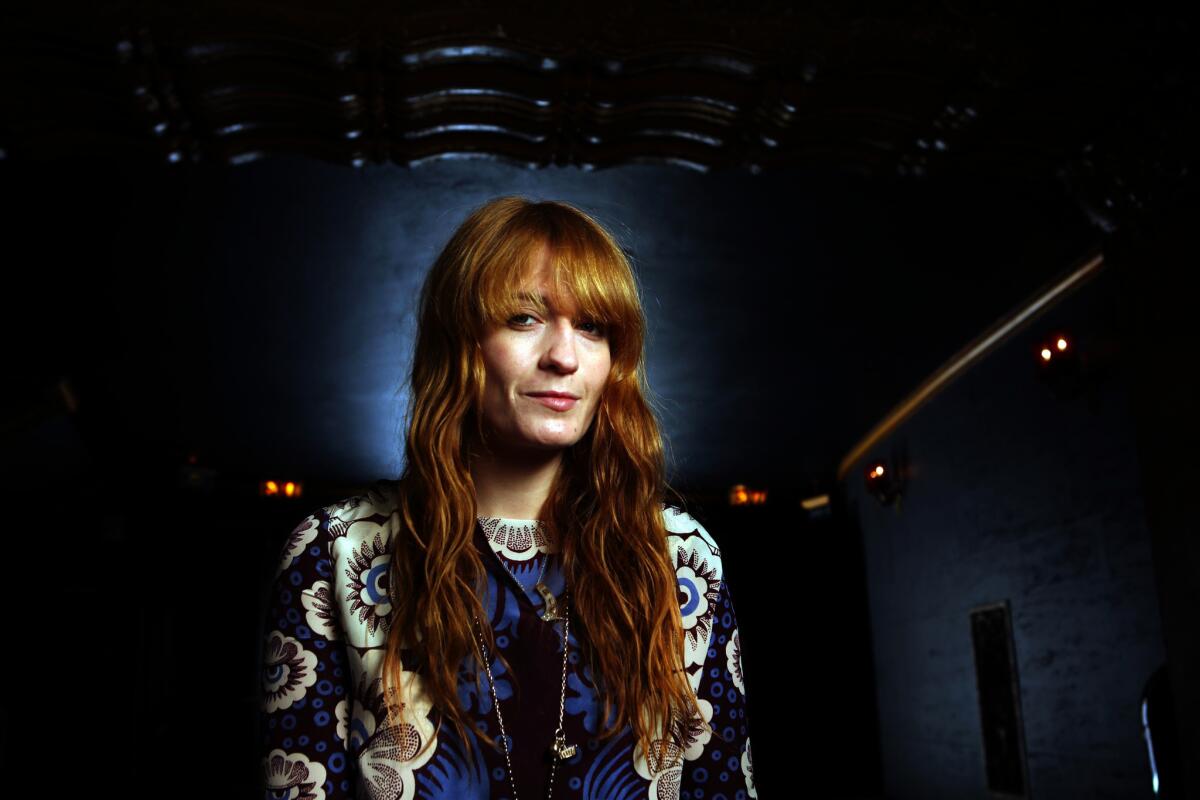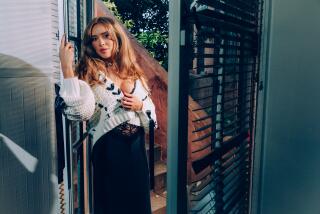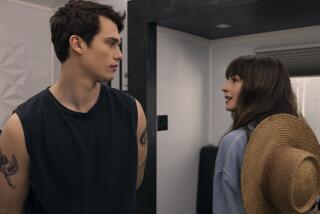Florence Welch says no tricks on new, stripped-down Florence and the Machine album

Florence Welch, lead vocalist of Florence + the Machine, inside the Theatre at the Ace Hotel in downtown Los Angeles on April 15.
Florence Welch flung open the door to her suite at the Chateau Marmont last month like a woman in the middle of an important task. Inside, dozens of designer gowns, maybe a hundred in all, hung on several clothing racks awaiting the singer’s careful inspection. Shoes and accessories sat in piles on the carpeted floor nearby.
The job she was doing, it turns out, was important: These were wardrobe options for one of music’s most style-conscious events, the Coachella Valley Music and Arts Festival in Indio, Calif., where Welch, one of music’s most fashion-forward stars, was due to perform in about a week with her popular British band, Florence and the Machine.
“Someone sent me this — it’s a pretty strong look,” said the 28-year-old, fingering a jade-colored number with a fur-lined neck that looked like something from “Game of Thrones.” The dress had a pair of matching fuzzy boots — less than ideal, it seemed, for Coachella’s sun-baked desert setting. “They might be quite hot,” Welch admitted with a laugh. “I could die if I wear them.”
In the end, the singer wore a crisp white pantsuit comfortable enough that at one point she leaped into the crowd — and promptly broke her foot. (More on that later.) Yet the outfit choice wasn’t merely a concession to climate; it also reflected the streamlined vibe of Florence and the Machine’s new album, “How Big How Blue How Beautiful.” Due Tuesday, the record takes a step away from the ornate sound and high-flown theatrics of the band’s earlier work, which presented the red-headed Welch as a quasi-mythical figure in sweeping, harp-laden songs like “Dog Days Are Over” and “What the Water Gave Me.”
“It’s less ethereal now, with more of a rock edge,” said Lisa Worden, music director at L.A.’s influential KROQ-FM (106.7). “And the songs seem more personal,” she added, referring to “What Kind of Man,” the album’s driving lead single about an unreliable lover, and “Ship to Wreck,” in which the singer considers her self-destructive impulse. Other tunes describe an emotional bottoming-out in language that sets aside the elaborate metaphors of yore.
Curled on a sofa as she took a break, Welch said the record dispenses with the mannerisms she once used to protect herself. “I feel like there aren’t any tricks on it,” she said. “It just is what it is.”
Those tricks propelled Florence and the Machine to quick success. Raised in London amid an artistically inclined family — her mother is a professor of Renaissance history — Welch formed the band in 2008 with keyboardist Isabella Summers, a friend since they were teens. The group released its debut album, “Lungs,” the next year and found itself with a worldwide smash in “Dog Days.” “Ceremonials,” the band’s follow-up disc, came out in 2011, not long after Florence and the Machine opened a string of stadium concerts for U2. The platinum-selling album cracked the top 10 on the Billboard chart and earned two Grammy nominations.
In those days, “the studio was the place for the wrecking ball to come out,” said Summers, who explained that making music gave her and Welch the chance to “be weird and emotional and dramatic,” qualities that combined with Welch’s good looks to form a potent public image at a moment when mainstream rock wasn’t producing many new female stars.
Soon the singer, who’d dropped out of art school to pursue music, became a fixture on the international fashion scene, turning up at runway shows and performing at a Chanel event in Paris at the behest of Karl Lagerfeld. Musicians tapped her for collaborations as well, including the rapper ASAP Rocky and the mega-DJ Calvin Harris, who teamed with Welch for the million-selling 2012 hit “Sweet Nothing.”
In the process, her larger-than-life persona “became like an armor,” she said, dressed at the Chateau in flared jeans and a filmy purple blouse. “It made me powerful.”
Part of what that armor was guarding against was despair over the end of a romantic relationship; her image also made it easier to maintain the hard-partying lifestyle she’d developed over years on the road. So when the time came to begin work on the band’s third album, Welch’s initial instinct was to stick to it. She and the band took up residence in L.A., living in what she called a “big concrete doll’s house that had an elevator in the bathroom.” Songs started coming together for a concept album about a witch that goes on trial for murder in Hollywood — “like ‘The Crucible: The Musical,’” Welch said.
Yet the plan changed after she returned to England to work with Markus Dravs, whom she’d selected to produce the album after his work with Coldplay, Björk and Arcade Fire. “I was handing him songs like ‘Which Witch’” — it survived as a bonus track on the deluxe edition of “How Big How Blue How Beautiful” — “and he was like, ‘No, no — you can’t do that,’” Welch remembered with a laugh.
“I just felt that she’d definitely done the whole drama thing on the first two records,” Dravs said. “And I was sure she had another side that hadn’t really been displayed.”
Pushing away the witch-hunt material, Dravs encouraged Welch to concentrate on smaller-scale songs she’d been writing about her breakup. He also advised keeping the arrangements simpler, which Welch admitted was a struggle. She’d told the producer she wanted to make a record modeled on the stripped-down music she’d listened to driving around L.A. — Neil Young, in particular — but balked when she realized how vulnerable the sound made her feel.
“I was like, ‘Don’t we need more reverb? Can’t we have more backing vocals?’” she said. Not everything turned out so minimal: “Third Eye” builds to a euphoric climax; the title track, inspired by the California sky, shimmers with strings and horns. But in “Various Storms & Saints,” Welch is accompanied by little more than a lone electric guitar as she sings about “teaching myself how to be free.”
“I wanted to take that off the record right up till the last minute,” she said of the song. “It was so frightening.” Yet Dravs convinced her that letting go — not hiding behind the band’s old wall of sound — could be another form of empowerment. “And that was such a relief,” she said. “Keeping that poise and that grandeur was hard.”
Welch certainly embodied a sense of newfound freedom in her performance at Coachella, where she repeatedly ran barefoot from one end of the gigantic main stage to the other. For “Dog Days Are Over” the singer urged people in the crowd to take off their clothes then joined in by stripping down to her bra and jumping offstage. She knew immediately she’d hurt herself but finished the concert with few aware of what had happened. Since then Florence and the Machine has been playing acoustic-style gigs with Welch seated on a stool, as she was this month on “Saturday Night Live.”
Watching Welch perform that way reminds Summers of a “caged animal,” said the keyboardist. “It’s frustrating having to watch her being frustrated.” Still, the quieter concerts have led audiences to “listen super-intently,” Summers acknowledged, a situation that suits the new material. And Welch expects to be healed by late June, when Florence and the Machine is set to play England’s venerated Glastonbury festival. (The group is also booked for other summer festivals including Bonnaroo and Lollapalooza.)
But whatever happens with her foot — and therefore her ability to support the album as she’d like — Welch said the experience of making “How Big How Blue How Beautiful” has been its own reward.
“It’s like self-acceptance on a grand scale,” she said. “If you’re going to put these songs into the world, you’ve got to be OK with them yourself.” The unguarded music allowed her to “come back to the person I was before all of this,” she said, waving at the luxury goods filling a sizable portion of her room. “It made me more comfortable in my own skin.”
Follow @MikaelWood on Twitter for more music news.
More to Read
The biggest entertainment stories
Get our big stories about Hollywood, film, television, music, arts, culture and more right in your inbox as soon as they publish.
You may occasionally receive promotional content from the Los Angeles Times.











